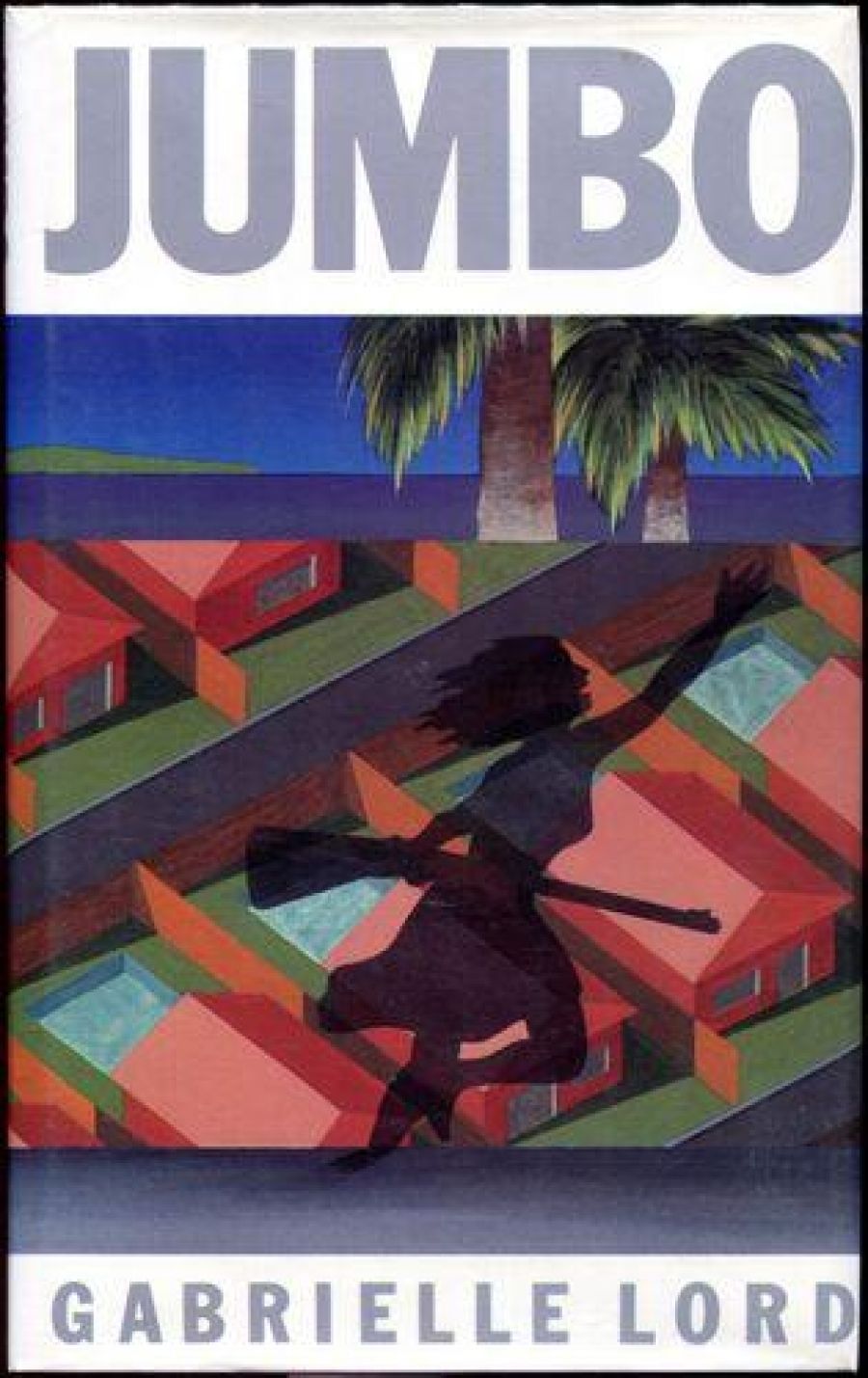
- Free Article: No
- Contents Category: Fiction
- Review Article: Yes
- Online Only: No
- Custom Highlight Text:
Gabrielle Lord’s novels – Fortress, Tooth and Claw and now, Jumbo, are all topical, readable, and (I expect) highly marketable. Lord is a scriptwriter as well as a novelist and each of these books seems like a transit point between a great idea and the kind of film which makes you lean forward in your seat and temporarily abandon regular breathing. There is, however, much to be said for them, as novels. They are thrillers, but they are not merely escapist. The plots dislocate everyday events in a way which questions the validity of what passes as socially acceptable. On the other hand, pace, suspense, and social critique seem to substitute for the subtlety and detail which would transform these books into something more than temporarily exciting and even instructive reading experiences. For all the immediacy and significance of Lord’s novels, the vibrancy of her work often seems to me to lie in its potential, rather than in the text at hand. In this respect Jumbo, the most recent novel, does not surpass its predecessors.
- Book 1 Title: Jumbo
- Book 1 Biblio: Bodley Head, 157 pp, $19.95 hb
The mystery is developed through 150 pages of concealment and overstatement, through a dual plot which coincides toward the end, when revelation and resolution take over. This simple construction is, in fact, tremendously effective and narrative tactics of this kind account for the positive reactions of a number of people I’ve met, who use the words ‘gripping’, ‘chilling’, and ‘I couldn’t put it down’ (in themselves, formulaic responses) when they describe Gabrielle Lord’s work.
The style is accessible, even commonplace. But it is not necessarily banal; indeed, it is well suited to the kind of blunt social critique at which Lord excels. For example, the following condemnation of supermarket duplicity is part of a description which is as bold and direct as the advertising rhetoric which it contradicts: ‘Tan and pink hams, chemically brilliant, claimed to be farm-fresh, or old-fashioned, while outside the truck delivered them from the factory’. Similarly, a description of a shopping centre adopts the rhythm and simplicity of its antagonist – those slogans which promote individual shops and products in radio or television advertising: ‘Acres of shops selling uselessness; clutter for houses, cars, and backyards; fast-food bars, boutiques selling tacky, mean-seamed clothes; veneer particle boards, gummed and stapled, masqueraded as timber with plastic gilt handles’. However the style does not modulate sufficiently to do justice to variations in subject matter and its directness can be a liability, especially when emotions and reactions are described. For example, in the following passage Verity’s despair is histrionic and over-stated: ‘Up and down, she went, like a caged carnivore, turning on the same spot until the carpet was hot under her feet with the friction of her desperate passing’. When Verity receives an alarming letter she immediately ‘covered her mouth with her hands as if she might scream’. Astonishment, self-reproach, and grief are often described in unnecessarily exaggerated – or simply implausible – terms. This is particularly unfortunate because the characters in Jumbo are not only described in relation to the extraordinary events of the plot, they are equipped with a residue of topical and significant problems.
Verity’s residual misery results from a teenage pregnancy and the adoption of her only child. In recent years there has been a public acknowledgement of the emotional complexities of adoption and Verity’s obsession with her lost daughter (whom she names, obviously enough, Perdita) is a recognisably common situation. It is difficult to describe such an obsession with any subtlety. Words like ‘guilt’, and ‘remorse’, which appear frequently in Jumbo; seem inadequate. And the attempt to make Verity’s misery specific seems to me to be questionable. During the sixteen years that Verity mourns her daughter: ‘In every bath or shower she took, her brown nipples reminded her of motherhood. There was still the faintest line from navel to pubis that also marked the passage of a child’. It is remarkable that a character could daily confront (as opposed to accept) these bodily signs of her pregnancy. But does this effectively describe the estrangement between a self and a body whose history is inscribed so obviously on its surface? Or is this description more like narrative shorthand for the experience of the ‘relinquishing mother’?
The other half of the dual plot concerns Lisa, who, for much of the book at least, might be Verity’s daughter. Lisa is an unemployed teenager in Sydney’s Western Suburbs. She rejects a friend’s solution to the problem of poverty and disillusionment – even Lisa can see that having a baby and claiming Supporting Parent’s Benefit is a dubious way to achieve security. There are rumours about girls who have accepted even less satisfactory methods of escape from poverty. Ultimately, Lisa’s reaction to her situation is extreme and violent.
If the screenplay of Jumbo, on which Gabrielle Lord is currently working, receives the right kind of cinematographic attention it will make a film every bit as good as The Empty Beach. But for this to happen, Jumbo will need more than the exciting plot and topical characterisation which are the chief strengths of the novel. Unfortunately the novel falls short of the expectations which its strengths generate.


Comments powered by CComment